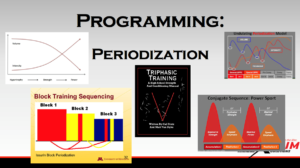by Mitch Hauschildt, MA, ATC, CSCS
I’m really excited to be speaking at this year’s annual Rockstock event in Miami this weekend. It is 2 days of fun, great education, sand, music and awesome people. If you aren’t already registered, time is running out. You want to be there!
This year’s theme is resilience. Every speaker is discussing their own take on making people resilient. In my presentation on Sunday morning, I will discussing how we can balance adaptation and a number of different variables both physically and mentally to create strong, tough, resilient individuals.
As a bit of a preview of my presentation, today we are going to discuss some physical resilience concepts that are important for creating physical resilient individuals.
In my opinion, physical resilience comes down to groaning for glory. What does it mean to groan for glory? It means that you are willing to endure some discomfort and difficulties to achieve the glory that you are training for. It means that you are willing to put yourself through times of discomfort so that you may achieve the goals that you have in front of you.
While it doesn’t mean that you have to enjoy pain, it does mean that you have be willing to tolerate it. When I say that, it doesn’t mean that you have to tolerate actual physical pain from injury. But, what it does mean is that you have to willing to tolerate discomfort in order to be successful.
Using this thought process, there are several key points to creating people who are physically resilient:
- Variety is the spice of life. Giving the nervous system a great deal of stimulation is a key to resilience. The body is constantly adapting to its environment, so giving it different stimulus will keep the brain from getting comfortable. Good training is just basic evolution. Give the body stimulus and watch it react. If you give it the correct stimulus, you get the product that you want. If you give it the wrong stimulus, you are going to get something that you don’t want.
- What you put into your body matters. I’m not a dietitian and certainly won’t pretend to be one. But, it is important to understand that our diet makes a huge difference in our resiliency.
- Recovery is king. Many people break down because of fatigue and poor recovery. When we get tired, we can’t perform. Managing recovery through sleeping patterns, specific programming, and recovery interventions (i.e. massage, cryo therapy, vasopneumatic devices, electrical stimulation, etc) is extremely important for resilience.
- Periodization is underappreciated. Managing proper load, volume, intensity, and recovery within training sessions and cycles is often misunderstood and under used by most people, especially clinicians. Building periodization into our overall programming significantly builds resilience.
These are just a few things that contribute to resilience. I encourage you to join us in Miami this weekend and if you can’t, please look into building resilience yourself and take action to make your clients and patients essentially bullet proof.


Leave a Reply